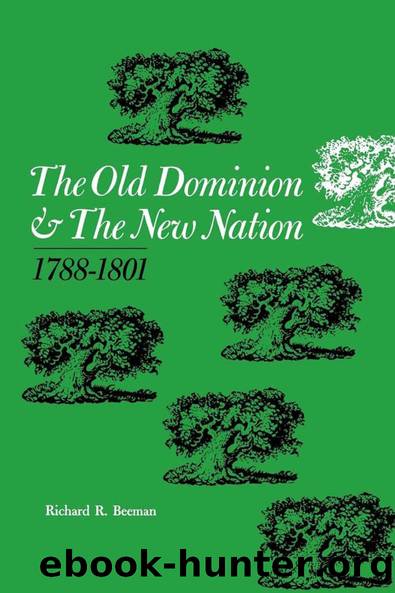The Old Dominion and the New Nation by Richard R. Beeman

Author:Richard R. Beeman [Beeman, Richard R.]
Language: eng
Format: epub
Tags: History, United States, State & Local, General, Revolutionary Period (1775-1800), Political Science, American Government, State, Political Process, Political Parties
ISBN: 9780813185781
Google: A0coEAAAQBAJ
Publisher: University Press of Kentucky
Published: 2021-10-21T22:13:21+00:00
1 For the best, if also the most polemical, treatment of the relationship between party development and foreign affairs, see Joseph Charles, The Origins of the American Party System: Three Essays (Williamsburg, 1956).
2 See, for example, Madison to Edmund Randolph, 17 Oct. 1788, in Hunt, ed., Madisonâs Writings, 5: 276; Jefferson to Richard Price, 8 Jan. 1789, in Boyd, ed., Jefferson Papers, 14: 420-24; Marshall, Washington, 2: 155.
3 Jefferson to David Humphreys, Paris, 18 March 1789, in Boyd, ed., Jefferson Papers, 14: 676-79.
4 Virginia Gazette and General Advertiser, 4 Sept., 2 Oct. 1793; see also Harry Ammon, âThe Formation of the Republican Party in Virginia, 1789-1796,â Journal of Southern History 19 (1953): 300-305. Ammon has done the most significant work to date in tracing the development of Republican party organization in Virginia. His articles, and his Ph.D. dissertation, âThe Republican Party in Virginia, 1789 to 1824â (University of Virginia, 1948), are essential to an understanding of the intricacies of Republican party machinery.
5 Virginia Chronicle, 8 June 1793, in Link, Democratic-Republican Societies, pp. 9-10.
6 âPetition of Severn Major,â Accomac County, 6 Nov. 1790, Legislative Petitions, VSL.
7 House Journal, 12 Nov. 1790.
8 John Taylor, Enquiry into Certain Public Measures, p. 21.
9 Ibid., p. 22.
10 Virginia Gazette and General Advertiser, 21 Sept. 1799.
11 âNotebook of William Hay: Considerations of Various Subjects of Enquiry Arising Out of the 6th Article of the Jay Treaty . . . With an Appendix containing . . . a Variety of Acts of the Virginia Assembly which can be Considered as Lawful Impediments to the Collection of those Debts,â Great Britain, Public Record Office MSS, Domestic, T79/27.
12 Ibid.; Beveridge, Marshall, 2: 186-98; William Wirt Henry, Patrick Henry, 3: 601-48.
13 Marshall, although his argument in Ware versus Hylton was instrumental in helping Virginians avoid the payment of debts, was one of the first to claim that the Republicansâ hostility to Great Britain, while âcloaked in the name of patriotism,â was in fact only an excuse to avoid paying their old British debts (Virginia Gazette and General Advertiser, 30 Oct. 1793). Although no one has yet determined whether Republicans or Federalists constituted the larger portion of debtors, it seems likely, given the similarity in the composition of the two factions, that enough members of each faction were in debt to the British to make all of them less than eager to find a solution for the payment of prewar debts. A final conclusion on this question, however, must await a detailed examination into the federal court records relating to British debts and a correlation of the findings of that investigation with the partisan divisions in Virginia.
14 Henry Lee to George Washington, 2 May 1793, Lee to Thomas Newton, 22 May 1793, Lee to Henry Knox, 3 July 1793, James Wood to John Hamilton, 10 Aug. 1793, Lee to Thomas Newton, 20 Feb. 1794, Executive Letterbooks.
15 Robert Brooke to John Hamilton, 22 April 1795, Brooke to the Secretary of State, 18 May 1795, Executive Letterbooks.
16 Circular Letter of John Page to the Citizens of the District of York in Virginia, 12 May 1794, Broadsides Collection, VHS.
Download
This site does not store any files on its server. We only index and link to content provided by other sites. Please contact the content providers to delete copyright contents if any and email us, we'll remove relevant links or contents immediately.
The Secret History by Donna Tartt(16738)
The Social Justice Warrior Handbook by Lisa De Pasquale(11514)
Thirteen Reasons Why by Jay Asher(7849)
This Is How You Lose Her by Junot Diaz(5837)
Weapons of Math Destruction by Cathy O'Neil(5090)
Zero to One by Peter Thiel(4875)
The Myth of the Strong Leader by Archie Brown(4816)
Promise Me, Dad by Joe Biden(4489)
Beartown by Fredrik Backman(4473)
How Democracies Die by Steven Levitsky & Daniel Ziblatt(4457)
Stone's Rules by Roger Stone(4447)
The Fire Next Time by James Baldwin(4387)
100 Deadly Skills by Clint Emerson(4118)
A Higher Loyalty: Truth, Lies, and Leadership by James Comey(4069)
Rise and Kill First by Ronen Bergman(4058)
The David Icke Guide to the Global Conspiracy (and how to end it) by David Icke(3925)
The Farm by Tom Rob Smith(3902)
Secrecy World by Jake Bernstein(3817)
The Doomsday Machine by Daniel Ellsberg(3767)
